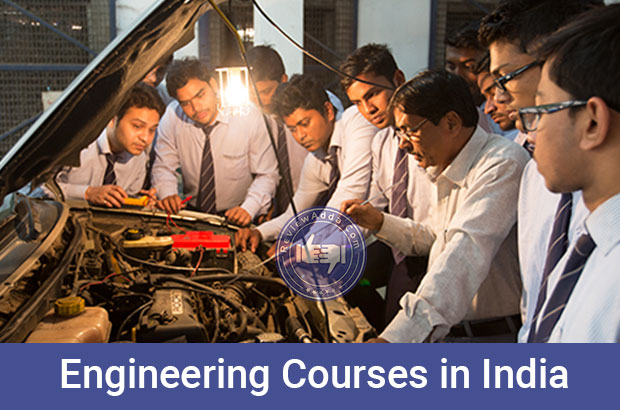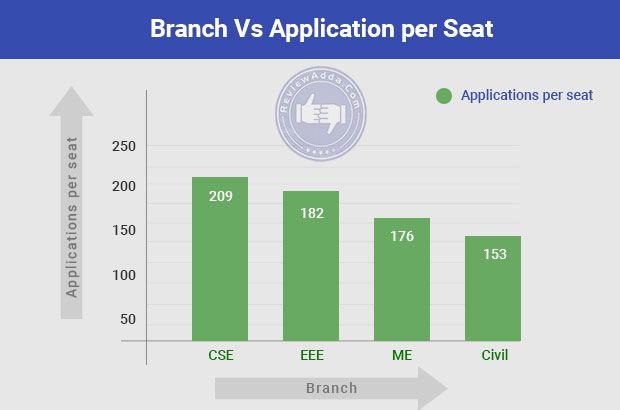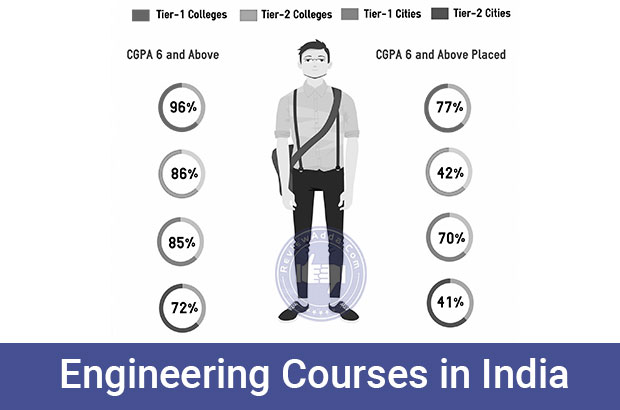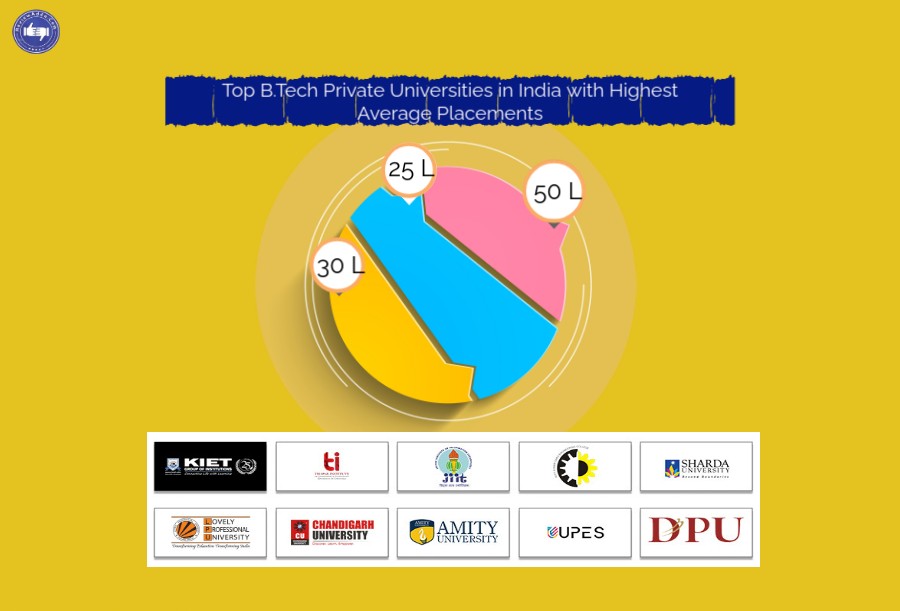
Over 1.2 million engineers pursuing various different engineering courses graduate every year
In the mela of our education system, specificity and real information are often lost. Many preach medicine and engineering as the only options once school is done. What is often missing in these sermons in the real meaning of engineering? What does it really entail? Is it simply four-year hogwash or does it actually demands a lot?
Engineering courses aren't general sciences courses. As fields, engineering courses details nearly everything under the sun. Nearly every object today is designed, manufactured, processed and managed by an engineer. To handle a working chain of such magnitude requires professionals capable of perceiving, understanding and executing the process.
Divided into many areas, engineering courses were deemed a necessity during industrialization. While the focus in those days was merely on industries and infrastructure, modern-day engineering courses have spread their wings across the workings of every field in the world. From software and electronics to petroleum and marine, engineering courses are taught across all fields.
Top branches of engineering are usually the hardest to get as most students go for such engineering courses.
Engineering courses: The right choice or the only choice?
As a course, engineering coursesare one of the most demanding subjects in the world; consequently they should not be misconstrued as a trend.
Many students today are choosing engineering courses out of sheer ignorance. The situation in India is growing dire with every passing year as students are flocking for engineering courses while other fields gather dust. Many below par engineering colleges are operating without supervision as they churn out poor quality engineers every year.
This situation is degrading the overall quality of the engineering gene pool. Many companies today are growing frustrated with the lack of industry-ready graduates.
The solution here lies only with people and their mindsets.
While engineering is an illustrious profession, it is not a bandwagon anyone can hitch a ride on. Parents and teachers need to realize the importance of a student’s aptitude. Manufacturing engineers incessantly disregarding where their true potential lies is nothing short of a planned robbery. To be crystal clear, students should only pursue engineering courses if they are ready to face the barrage of challenges and obstacles in their way. In a country where lawyers and bankers were once pursuing engineering courses, it is fundamentally important for students to choose the right line of education and work.
Top 10 branches of engineering courses always get filled up first during counselling as students are convinced by teachers and parents at time to swallow the bitter pill.

Over 180 students apply for each seat in IIT Bombay every year for various engineering courses
Engineering courses offered in India
Once the decision to pursue engineering has been made, the next step is to choose which one of the many engineering courses one wishes to study for four long years. Each of the engineering courses has their own merits and demerits.
Some engineering courses today are relatively new designed specifically for modern day problems. Some engineering courses though, belong to an older ilk. The idea of new engineering courses is also derived from specific areas of the regular old branches. Engineering courses list is given below, witha brief analysis of nearly all engineering courses being offered today in India. List of engineering courses after 12th are given below
1. Computer Science Engineering (CSE)
Arguably one of the world’s most popular engineering courses, Computer Science Engineering has become the most elite branches of engineering in the world. One of the engineering branches in demand, CSE as an engineering course focuses on everything remotely related to computers. This includes bare metal knowledge of subjects like System Architecture, Data Structures, Data Mining, Graph Theory, Algorithmic Learning and much more.
Due to its all-encompassing nature, CSE is one of the few engineering courses with literally no boundaries as far as tech is concerned. The greatest minds of the tech business such as Steve Wozniak, Bill Gates, Mark Zuckerberg and much more were once enrolled in computer science engineering courses at their respective universities.
In terms of placements and salaries, there aren’t many engineering courses currently competing blow to blow with CSE. It is one of the best engineering courses with high salary packages. The ones who do come close are derivative engineering courses of CSE itself. In a world where no field matches the dynamism and interest generated by the tech industry, there has never been a better time than today to choose CS engineering courses.
2. Electronics and Communications Engineering (ECE)
One of the older and trusted engineering courses, Electronics and Communications Engineering has always been amongst the list of the top branches students prefer during counselling. Almost any modern-day appliance today which operates with a remote or fits in your hand has the hard work and knowledge of an EC engineer.
The EC engineering courses structure involves 60% electronics and 40% communications. EC engineering courses are very detailed and in-depth in nature. Focusing on topics such as Digital Circuits, Digital Signal Procession, Network Analysis, Integrated Circuits, Telecom Network etc, EC engineering courses mould students according to current industry standards to focus on every aspect of current flow on a microscopic level.
EC engineering courses in terms of marketability are reliable amongst other branches of engineering as core companies such as Schneider Electric and CISCO along with IT companies consider EC engineers for recruitment.
3. Mechanical Engineering (ME)
More commonly known as ‘Mech’ in colleges across India, Mechanical Engineering is one of the oldest engineering courses in the world.Referred to as one of the evergreen engineering courses, Mechanical Engineering is a highly technical course teaching principles behind a number of industries like automobiles, aeronautics, aerospace, refrigeration, air conditioning etc.
While Mechanical is historically one of the most important engineering courses, the recent slump in major industries and a general shift to automation and robotics has rendered mechanical engineers unnecessary in some sectors.
However, due to the versatility of the engineering course and the challenging nature of the coursework, many companies hire mechanical engineers due to their problem-solving skills and a general knack for algorithm development.
4. Information Technology (IT)
The fastest growing branch of engineering today, IT engineering courses have tapped the IT sector bubble to race ahead of other branches in terms of demand and placements. A derivate branch of CSE, IT subjects in engineering on using systems and algorithms designed by CSE engineers to meet the demands of clients and consumers.
The curriculum of CS engineering courses is often considered too broad and overtly in-depth to allow focus on application-based problems. Subjects such as system security, network architecture and network management signify the industry based nature of IT.
Less difficult than CS engineering courses, the best part of IT is its incredible placement record. Many companies are allowing CS and IT graduates to sit together during campus placements, a move which clearly illustrates the impact IT engineers have had in the tech industry.
Amongst all engineering courses, expect IT to grow the fastest.
5. Electrical and Electronics Engineering (EEE)
Electrical and Electronic Engineering is one of the old school engineering courses focusing on the electrical side of electrodynamics. There is always debate over whether EC is a sub-branch of EEE or if it is the other way round, but both fields have moved further away from each other over time.
EE engineering courses curriculum are divided into electrical and electronics subjects, 70% going to the former and 30% to the latter. The EE engineering courses focus on electrodynamics on a macroscopic level. The core sector of this industry is based on electrical boards, appliance firmware, power utility and power transmission.
EEE's biggest recruiter has recently been the IT sector. This has caused many power companies such as Reliance Power, Tata Power, NTPC, BHEL etc to look for mechanical and civil engineers as they are unable to match the hiring potential of the IT sector.
6. Civil Engineering (CE)
Civil Engineering, along with mechanical, is one of the few engineering courses seated a long way behind in history. For as long as modern society has existed, there has been an incessant expansion of infrastructure. From building monuments and castles in the medieval era to building skyscrapers and urban rail networks, civil engineers have always fuelled growth.

The ratio of students placed in Tier 1 colleges across all engineering courses is monstrously high
Civil engineering courses imbibe all traits necessary to mould a student into a top draw civil engineer. Subjects such as Structural Mechanics, Surveying, Strength of Materials, Building Construction and Design of Structures teach a student to plan every process of constructing a building from the bottom to the top.
While many reports downplay high-grade placement prospects for the civil engineering courses, students from top colleges always get high salary packages. Since the job itself is so intricate and important, companies are very careful during recruitment. A top civil engineer earns almost as much as a top CS engineer, sometimes even more.
7. Chemical Engineering (CHE)
Though Chemical Engineering is one of the old engineering courses, it isn’t as famous as its aforementioned counterparts in India. However, in the US and other developed countries, chemical engineering courses are one amongst the most popular courses. Due to the lack of a thriving national pharmaceutical industry in India, many students prefer to opt for other mainstream engineering courses instead.
Chemical engineering courses primarily target efficient methods of chemical production and control. Some subjects from its curriculum include Chemical Process Industries, Chemical Engineering Thermodynamics, Process Equipment Design and Mass Transfer.
Students pursuing this engineering course are recruited by companies based abroad, where their packages can rise astronomically due to a booming pharmaceutical business. Thus, only students ready to move away after four years should pursue chemical engineering courses. Many petroleum companies look at chemical engineers too.
 Get Updated Review ( Voice Based Alumni Feeback)
Get Updated Review ( Voice Based Alumni Feeback)
-
 Check Review (Alumni Feedback) - Lovely Professional University - [LPU] – Click Here
Check Review (Alumni Feedback) - Lovely Professional University - [LPU] – Click Here -
 Check Review (Alumni Feedback) - Amity University – Click Here
Check Review (Alumni Feedback) - Amity University – Click Here -
 Check Review (Alumni Feedback) - Ansal University – Click Here
Check Review (Alumni Feedback) - Ansal University – Click Here -
 Check Review (Alumni Feedback) - GD Goenka University – Click Here
Check Review (Alumni Feedback) - GD Goenka University – Click Here -
 Check Review (Alumni Feedback) - Ansal University – Click Here
Check Review (Alumni Feedback) - Ansal University – Click Here
8. Aeronautical Engineering (AE)
Aeronautical engineering is one of the many derivative engineering courses of the mechanical department. With the number of first-time fliers increasing every year, this industry is expected to surpass the Indian Railways in the near future. Grappling with such momentous potential, aeronautics promises to be an incredible option for engineers.
One of the sub-mechanical engineering courses, Aeronautical consists of subjects like Aircraft Structures, Flight Dynamics, Aerodynamics, Propulsion and Avionics.
Aeronautical Engineers find many takers in private airlines as well as government-funded organisations like DRDO, ISRO, HAL, Air India, DRDL and civil aviation department.
9. Biotech Engineering (BTE)
Biotech Engineering courses started off in India during the turn of the millennium when it was being touted as the next big industry in the making. Seventeen years down the line, it will be fair to say that Biotech engineering courses failed to live up to its potential.
Like chemical, biotech engineering courses are a much better option if students are ready to move abroad after graduation. India’s current jobs market does not forecast any explosive growth for the Biotech sector. Essentially a research-based stream, only students looking to do research usually take up Biotech engineering courses.
Biotech engineers find recruiters usually in pharmaceutical companies. Since this field is more research-oriented, many students pursue higher studies after graduation rather than taking up jobs.
10. Instrumentation and Control Engineering (ICE)
Amongst the sub-electronics various engineering courses, Instrumentation and Control Engineering deals with the designing and developing control systems as well as the development of sensors, transducers and other devices. Though IC started off in the periphery of EC engineering courses, it has forged into an entirely separate division immense possibilities in emerging fields like robotics and automation.
Though IC engineers are usually hired by IT companies, the future holds something much more exciting and dynamic for IC engineering courses. One can only imagine its level of application when robotics and automation ingratiate into human life.
11. Automotive Engineering (AME)
Another one of the highly specialized engineering courses, automotive is a sub-branch of mechanical engineering. As the name suggests, this Automotive engineering courses are based on every aspect of automobiles. Research, design, manufacturing, inspection and management of automobiles is taught in depth during the four years of automobile engineering courses.
Placement for automobile engineers is usually strong as the automobile industry loves graduates to be well versed in every aspect of an automobile.
12. Aerospace Engineering (ASE)
Like Aeronautical Engineering, Aerospace engineering courses deal with aeroplanes as well, but they encompass engineering of bodies designed to fly outside the earth’s atmosphere. A broader field than aeronautical, aerospace engineering courses are still peripheral to mechanical engineering courses dealing with all types of aircraft and aeroplanes.
While this field is specifically dedicated for space flight, most aerospace engineers are recruited by the same companies coming for aeronautical engineers. Engineers from this field usually go abroad for better research facilities and higher growth.
13. Mechatronics Engineering (MTE)
An amalgamation of mechanical, EC and IC, Mechatronics engineering courses are another new age branch which could be vital for the development and research of robotics. The concept of mechatronics is to make mechanical devices easier to operate by using electronic instrumentation. An example can be cited in cars running on electricity, which combine core principles of both fields to produce an economical and eco-friendly substitute to fuel-driven cars.
Though placements in Mechatronics engineering courses are yet to hit it off, research opportunities and future growth are undeniably important. Many students from this field usually move abroad after graduation in search of better growth and opportunities.
14. Production and Industrial Engineering (PIE)
A field borne from mechanical engineering courses, Production and Industrial Engineering focuses on the management aspect of mechanical engineering. Like specific fields like automobile, production and industrial encompasses the management side of handling a shop floor of a manufacturing unit.
Students pursuing PI engineering courses are proficient in handling every aspect from production and planning to inventory and incoming. Many manufacturing companies like Maruti, Tata Steel and Motors and Hyundai hire production engineers to map out the entire process of production in their factory unit.
15. Mining Engineering (MNE)
A sub-branch of chemical engineering courses, Mining focuses completely on mining operations such as ore mapping, planning, extraction and cleaning. Offered by top institutes like IIT Kharagpur, mining engineering is a very promising field considering the various mining operations across the country.
Companies such as TATA Steel, Bhushan Steel, Vedantaetc hire top draw mining engineers in droves due to obvious demand, but this sector has a tendency to fluctuate over time.
16. Petroleum Engineering (PE)
While it is relatively unpopular amongst other engineering courses in India, Petroleum Engineering is one of the world’s most coveted engineering courses. Due to the decline in non-renewable fuels, companies are scrounging the planet to find oil. This has resulted in an unforeseen rise in the hiring of petroleum engineers in the world. Some of the packages offered to petroleum engineers blow top CS and IT engineers out of the water.
Oil drilling companies such as ONGC and IOC in India and BP and Exxon abroad hire petroleum engineers every year at high salary packages.
17. Ocean and Marine Engineering (OME)
Ocean and Marine Engineering combine basic engineering courses like civil and mechanical with oceanography and marine geology to gauge coastal environment and build instruments to control these situations. Institutions like Indian Maritime University and VELS Academy of Maritime offer ocean and marine engineering courses.
Many offshore oil drilling companies hire ocean engineers for emergency situations such as offshore oil recovery or oil spills. Other jobs include remote sensing, Naval Architecture and Marine transportation.
18. Biomedical Engineering (BMD)
Biomedical Engineering courses use design and engineering concepts for medical and biological needs. Some applications of this field include CT scanners, ultrasound machines, MRI etc. Biomedical engineers are usually tasked with designing products like artificial kidney, livers and other organs which have to be replaced and machines for helping in patient diagnosis.
Biomedical engineering courses have not gained significant ground in India yet due to lack of funding. Engineering courses such as these are very research oriented and warrant a great deal of patience from students.
19. Structural Engineering
A derivative of civil engineering, structural engineering courses deal specifically with the structure of buildings. Structural engineering courses teach predicting and knowing the stability and rigidity of structures already constructed. In essence, structural engineers act as consultants to civil engineers during and after the construction of a structure.
Companies like L & T, NHAI, Essar group etc hire structural engineers straight out of college for built structure testing and analysis.
20. Architectural Engineering
Architectural Engineering courses provide the proverbial link between architects and civil engineers. Essentially, architectural engineering courses are multi-thronged where engineers learn both about the architectural side as well as implementing engineering principles during construction.
Architectural engineering courses have similar recruiters to other civil related branches of engineering, such as L & T, NHPC etc
21. Computer Engineering
Unlike IT or CS, Computer Engineering courses involve the design, manufacturing and maintenance of hardware parts of computers. Although this field is purely based in hardware, many IT companies are said to allow computer engineers to sit for interviews during campus recruitments in colleges across India.
Computers and computing accessories manufacturers hire computer engineers as it is their core area of dissertation.
22. Robotics Engineering
Robotics is one of the newest engineering courses currently in colleges. While many cogs contribute to this field, robotics engineering courses are an essence of the fundamentals of this field and the opportunities it presents in the future.
Robotics engineering courses are purely research-based and not many companies are currently hiring robotics engineering specifically.
23. Microelectronic Engineering
Microelectronics is one of EC’s peripheral engineering courses focusing on design, manufacturing and development of microprocessors and microchips. In today’s world, nearly every electronic device comes attached with micro-electronic peripherals. The field involves the design of different microchips to suit different applications.
Companies like Intel, AMD, ATI and Nvidia hire professionals from microelectronic engineering courses every year. This field is relatively new in India but is very exciting due to nearly as many applications like EC’s electronic courses.
24. Environmental Engineering
Environmental Engineering courses combines the principles of engineering and environmental science to develop solutions which are eco-friendly and efficient. Environmental engineering courses are gaining a lot of popularity due to various environmental issues gaining popularity such as climate change, global warming, deforestation, greenhouse effect etc.
India’s jobs market is still relatively new to these types of engineering courses. However, this trend is taking off in Western countries where businesses are looking for eco-friendly solutions for engineering problems.
25. Agricultural Engineering
Agricultural Engineering courses involve development of monitoring systems to predict crop patterns according to different weather forecasting. Other factors like pollution, machine efficiency and power supply can also be fed into such systems to predict results.
Besides the government, many agro-based industries employ graduates from agricultural engineering courses as analysts to forecast crop and yield patterns.
26. Paper Engineering
Paper Engineering, one of Mechanical’s derivative engineering courses is designed specially to focus on the process of paper production. Paper engineering courses include studying the raw materials such as wood, processing of the wood pulp and maintenance of the product which is paper. A highly specialized field, paper engineers are recruited mainly by wood processing units and notebooks or paper manufacturing companies.
IIT Roorkee is the only top college in India providing agricultural engineering courses at the moment.
27. Sustainability and Design Engineering
Moving hand in hand in with Environmental Engineering, Sustainability and Design engineering courses are a new age necessity for building systems which consume non-renewable resources conservatively. This field is applicable in nearly all engineering courses as excessive fuel consumption has to be controlled in every sector.
The Energy and Research Institute (TERI), New Delhi is a very famous college known for providing engineering courses based on sustainable engineering. The scope for these kinds ofengineering courses is huge considering every sector’s need to cut down on fuel and energy costs.
28. Systems Engineering
Systems engineering coursesinvolve design and management of working complex systems to manage their lifespan. These engineering courses include designing of the process involved in manufacturing to make the best use of the resources available.
Engineering courses such as these are very rare and are offered mainly in Top colleges in India such as IIT Kharagpur, IISc, IT-BHU and IIT Jodhpur. Usually, this course is preferred by students during post-graduation, but the trend of selecting specialized engineering courses for graduation is slowly becoming a phenomenon in India.
29. Geological Engineering
Engineering Geology engineering courses essentially involve accounting of geological factors while identifying engineering data such as location, construction, operation and maintenance. This field is very useful civil engineers as they monitor every discernible factor of an area before commencing construction. Often times, geological engineering courses are considered a composition of civil, mining and petroleum engineering.
Many construction companies hire undergrads from geological engineering courses for surveying sites before construction, especially in areas which are prone to natural disasters like earthquakes or tsunamis.
30. Nuclear Engineering
Nuclear energy is one of the most exciting engineering courses in modern-day energy science. In such an environment, nuclear engineering courses are slowly emerging as a highly tempting field with exciting possibilities awaiting students after college. From learning about nuclear materials and radiation, students are taught about the construction, operation and maintenance of nuclear reactors and nuclear power plants.
While these engineering courses are shrouded with the controversy of weaponizing of nuclear materials, there are many other clean energy possibilities which are worth considering this field as a noble profession. Engineering courses such as these should only be considered by students interested in research work. Many top colleges in India such as PanditDeendayal Petroleum University, IIT Bombay, IIT Kanpur and IIT Madras provide nuclear energy as one of their specialized engineering courses.
31. Geomatics Engineering
Also known as geospatial engineering, geomatics engineering courses involve the use of spatial data for measurement and visualization of data. This is a field sharing much of its DNA with surveying engineering. Since engineers cannot travel to all locations every time, geomatics engineers come in handy when a certain location has to be analyzed and surveyed without actually going physically to that location.
Geomatics engineering courses are again in the same vein as Civil Engineering Courses, although their responsibilities are limited. Construction companies, bridge and dam construction companies and even some government agencies require geomatics engineers.
32. Textile Engineering
All the processes and methods involved in the manufacturing and production if textiles are covered in textile engineering courses.This is one of the old-school of engineering courses famous during the early days of Indian urbanization. The IITs started the regular branches of engineering along with textile engineering courses to meet the growing demand for engineers in textile shopfloors and factory units.
33. Nanotechnology Engineering
A very promising field for the future, nanotechnology engineering courses main focuses on changing properties and structures of materials on a molecular level to improve the performance or eliminate problems. These types of futuristic engineering courses can bring a revolution in fields such as EC and Biotech which already work on a microscopic level.
Pollution tests, electronics design, medicine analysis and cancer research hire professionals from nanotechnology engineering courses for data analysis and molecular altering on a nano level.
34. Naval Engineering
The design, research, development, construction, operation and maintenance of surface and underwater vessels are covered under naval engineering courses. This field primarily focuses on building naval vessels for the navy. Another one of the multi-thronged engineering courses, naval requires knowledge of all departments of engineering for the efficient management and operation of a vessel.
The Indian Navy is the primary recruiters of naval engineers. Along with marine engineering courses, naval engineering courses arealso taught at IMU under the direct purview of the armed forces.
35. Fire Protection Engineering
Use of engineering ideas to protect and prepare people and properties from fire hazards and smoke are covered under Fire protection engineering courses. The focus of these engineering courses mainly lies in designing systems to contain or sometimes prevent fire hazards. These systems include fire detection systems, fire suppression systems, passive fire protection and smoke control and management.
Colleges offering Fire Protection engineering courses include UPES, CUSAT and National Institute of Fire Engineering and Safety Management. Many big corporations hire fire engineers to be protected from any hazard that might take place. Smoke alarm companies and fire stations hire fire engineers too.
36. Motorsport Engineering
This Engineering Course is offered only in a select few colleges in India. An amalgamation of mechanical and automobile engineering, Motorsport Engineering courses focus purely on using mechanical and automobile engineering principles to solve motorsport problems. Though this field is highly specialized, passionate students couldn’t ask for a more industry-driven course than this.
Hindustan Academy was the first to offer this Engineering course in collaboration with University of Derby, UK. The programme entails two years in India and two years in Derby as part of a graduate degree in motorsport engineering. Amongst recruiters for motorsport engineers are teams competing in motorsport championships such as F1, Moto GP, F2 etc.





.jpg)

